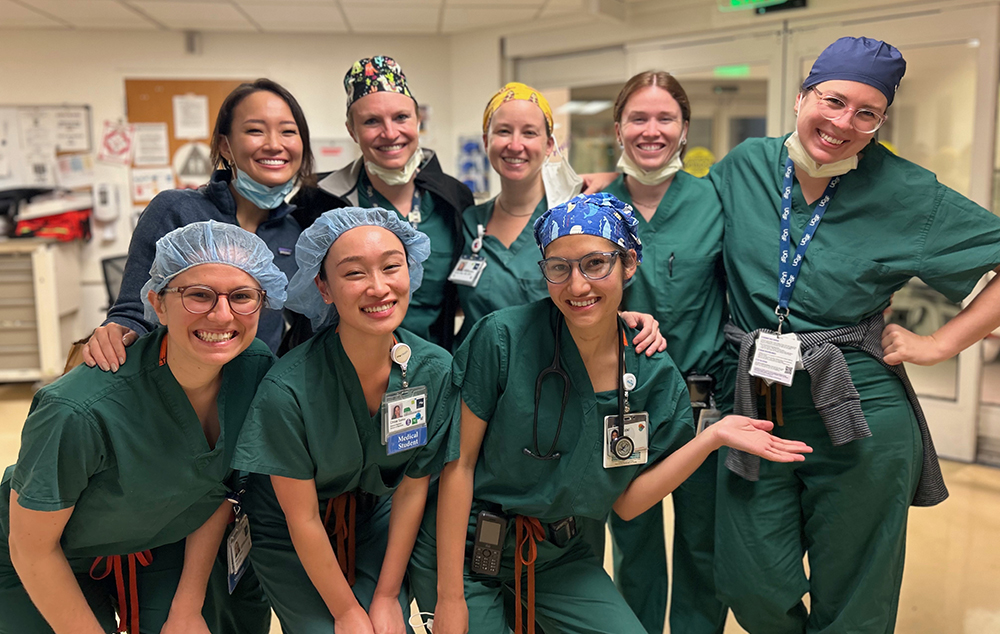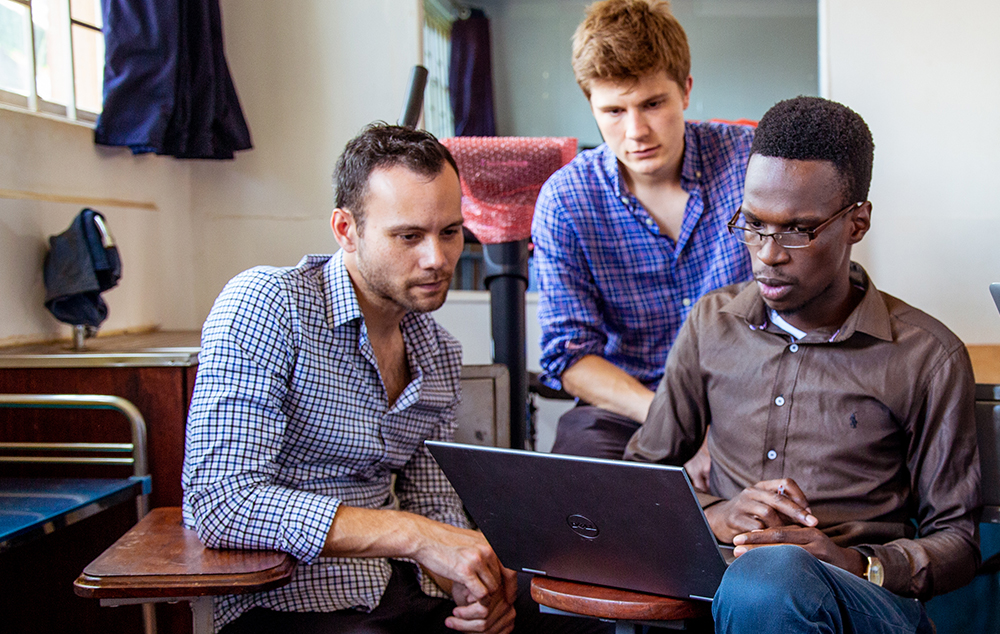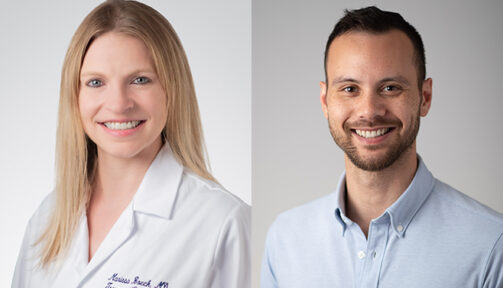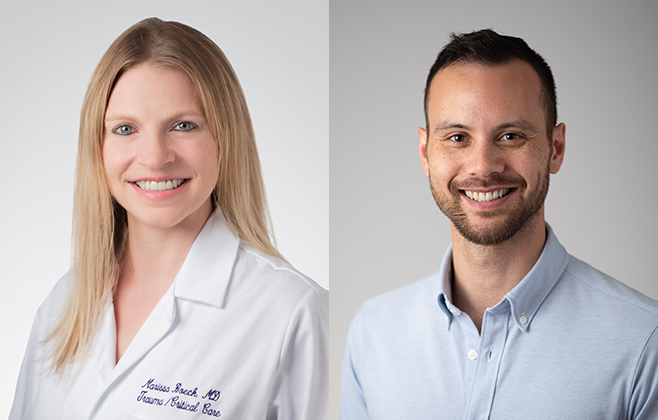The IGHS Affiliate Program awarded its 2023 Early Career Global Health Scientist Awards to surgeon Marissa Boeck, MD, MPH, and anesthesiologist Tyler Law, MD. In addition to caring for patients and mentoring trainees, both do research that spans vital trends in global health.
From 30,000 feet, the most important global health trend is this: Experts from high-income countries are now less likely to parachute into resource-constrained countries and present one-size-fits-most solutions to their local health and health care challenges. Researchers have seen the advantage of supporting local experts and institutions abroad, and many have leaned heavily into overlooked problems and underserved populations in the United States.
One might observe a second key trend: a push to expand global access to surgical care, which has never garnered as much attention as infectious disease and maternal and child health.
Boeck and Law, as core members of the UCSF Center for Health Equity in Surgery and Anesthesia (CHESA), help advance its mission to expand access to surgical care by supporting local experts and communities. Both also bring out-of-the-box approaches to these efforts, earning them recognition through the Early Career Global Health Scientist Awards.
Marissa Boeck: Think globally, act locally
Boeck, a trauma and critical care surgeon, first came to UCSF in 2018 for fellowship training at the Priscilla Chan and Mark Zuckerberg San Francisco General Hospital and Trauma
Center (ZSFG). A background in global health work influenced her perspective on the systemic needs she found at the public hospital.
“It really struck me, being in San Francisco – one of the most expensive places to live in the country if not the world – that we still had patients with enormous needs, mainly socially, that were impacting their overall health and wellbeing,” Boeck said.
Her research agenda has sought to address two areas of need closely tied to surgery. Boeck is examining which social factors make gun violence more common in some San Francisco neighborhoods than in others. The higher rate in neighborhoods that were once redlined suggests structural racism plays a part.

Boeck was blunt about what compelled her to study the underlying causes of gun violence.
“I’m passionate about trying to prevent firearm injuries before they get to us because there’s really only so much we can do once they arrive in our emergency room,” she said.
Surgical care successfully patches up 19 of 20 patients who need surgery for an injury, but Boeck noticed that the data doesn’t say much about what happens to patients after discharge. Boeck explained that many must recover at home before returning to work and other essential life activities.
In an NIH-funded project, Boeck will recruit patients to share their experiences after injury to better tailor the outpatient care and social services they receive. This work, which piggybacks on innovative wraparound care models used at ZSFG, draws on insights gleaned globally.
“The thing I’ve seen both domestically and internationally is that we do a lot of talking about people without talking to them,” she said. “You’re limited in how much impact you can make that way – the people you’re trying to help and support have a ton of ideas because this is what they’re living through.”
Tyler Law: Better aligning health care supply and demand
All surgeons agree there isn’t enough surgical supply to meet global demand. But how much of that gap reflects a lack of surgeons, and how much reflects a lack of anesthesiologists, without whom surgeons can’t operate?
The global health community doesn’t have adequate data to answer that question, so anesthesiologist Tyler Law has taken it on.
“We can’t fix what we haven’t measured,” Law explained.
Law’s work includes a global mapping project to compare the per capita availability of anesthesiologists by country and region. It may not be surprising to find more anesthesiologists per capita in higher-income countries, but documenting the scale of the problem may help drive action.
“It’s an enormously useful advocacy tool to say there are more anesthesiologists in the 20-mile radius from where we are in San Francisco than there are in the country of Uganda,” Law said.
Uganda has a population of 50 million compared to California’s 39 million.
Law – whose global work centers on Uganda – has charted that, even per capita, there are more anesthesiologists in the capital, Kampala, than in other parts of the country. The mismatch of supply and demand has driven him to embrace economic research models.
Law led research where Ugandan anesthesiologists were asked to rank how likely they were to accept hypothetical job offers. The survey strategically tweaked the offers to identify which factors most increased the appeal of positions outside Kampala.
It turns out no one wants to be the only one. A lone anesthesiologist faces tremendous pressure to work long hours.
“If you imagine any given surgeon, they have a lot of patients to operate on. But anytime a surgeon is working, the anesthesiologist is working, too,” Law said.

By parsing economic pain points that influence health care providers in ways that contribute to limited surgical access, Law’s team could point to practical policies that might help. For instance, they have suggested recruiting anesthesiologists in pairs to work outside the capital.
“My colleagues at CHESA and I are all moving away from the vertical programming that has organized a lot of global health before,” Law said. “For me, that means merging policy and health systems factors.”
Law’s thinking on transforming the health workforce to improve health equity dates to his 2018 fellowship in UCSF’s HEAL Initiative, which explicitly links domestic and international efforts to propel equitable access to care worldwide.
“The whole underlying premise of HEAL is that people in need are people in need, whether they’re in Chinle, Arizona, or Malawi,” he said. “The distinction to be made is not where they are, but what they need.”
Visit their web pages to learn more about the IGHS Affiliate Program and CHESA.

